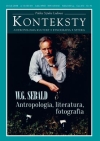Wyjechali Sebalda – hołd złożony Nabokovowi
Emigrants by Sebald – A Tribute to Nabokov
Author(s): George M. HydeSubject(s): Anthropology
Published by: Instytut Sztuki Polskiej Akademii Nauk
Keywords: Sebald; Nabokov; literature
Summary/Abstract: The Emigrants is a book more closely integrated as a narrative than The Rings of Saturn but still not a novel in any obvious way. I have called it “a novel in a kaleidoscope”, since it keeps getting shaken up by the presiding “fokusnik” (Russian for “conjurer”, a word Nabokov loved) and its focal point shifts accordingly, on both sides of the grave. An abyss keeps opening exactly where the narrator is standing, just as it does in many of Nabokov’s fictions. A shameless appropriation of photographs, some private as if really from the family album, some from the public domain, supports the narratives that seem to be emerging to clarify family histories but actually cast a further veil of darkness and death. Nabokov asks what the “real life” of his character (Sebastian Knight) is, and the answer is the page in front of your nose. Kantor wonders at the disappearance of his father but sees no point in setting out in his pursuit. Photographs simply confirm the deadly encroachment of time on anything we may think significant. We have all emigrated from a world we do not remember, as Nabokov reminds us in Speak, Memory. We are now on our way to another world from which no-one has ever returned. Our fate is a lonely one, like that of the principal protagonists of The Emigrants. Death shadows it, as it shadows Hersch Seweryn, or Henry Selwyn, in his Gothic house and garden not altogether unlike Max’s. The reported accident that took the life of Henry’s alpine guide friend emphasises what so many holocaust survivors felt: that they had no right to be living at all when so many had been murdered or had their lives utterly ruined. Paul Bereyter is an extraordinary embodiment of the falsifications of Nazi history and racial theory. Max gives him enough sympathetic attention to make us feel the tragic loss of a man of goodwill and culture. His suicidal depression might have been averted. But how? The Ambros Adelwarth story is perhaps over-complex but it is a bold attempt to grasp the nettle of American Jews and their astonishing creativity. To follow them consistently through their zig-zag progression over the “dream-bright” map of America is a challenge. To cap it, Max brings himself “home” to Norfolk, whence he travels to revisit the now successful artist friend from his Manchester days, Ferber.
Journal: Konteksty
- Issue Year: 2014
- Issue No: 3-4
- Page Range: 62-66
- Page Count: 5
- Language: Polish
- Content File-PDF

